 MyDogBreeds
MyDogBreeds Treeing Tennessee Brindle is originated from United States but Basque Shepherd is originated from Spain. Both Treeing Tennessee Brindle and Basque Shepherd are of same height. Treeing Tennessee Brindle may weigh 6 kg / 13 pounds lesser than Basque Shepherd. Treeing Tennessee Brindle may live 3 years less than Basque Shepherd. Treeing Tennessee Brindle may have less litter size than Basque Shepherd. Treeing Tennessee Brindle requires Low maintenance. But Basque Shepherd requires Moderate maintenance
Treeing Tennessee Brindle is originated from United States but Basque Shepherd is originated from Spain. Both Treeing Tennessee Brindle and Basque Shepherd are of same height. Treeing Tennessee Brindle may weigh 6 kg / 13 pounds lesser than Basque Shepherd. Treeing Tennessee Brindle may live 3 years less than Basque Shepherd. Treeing Tennessee Brindle may have less litter size than Basque Shepherd. Treeing Tennessee Brindle requires Low maintenance. But Basque Shepherd requires Moderate maintenance
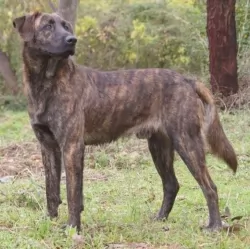 There doesn’t seem to be 100% clarity on how the dog came about but it originated in USA. It appears as though it was only since 1995 that records have been maintained through the American Kennel Club's Foundation Stock Service Program.
There doesn’t seem to be 100% clarity on how the dog came about but it originated in USA. It appears as though it was only since 1995 that records have been maintained through the American Kennel Club's Foundation Stock Service Program.
A Reverend Earl Phillips, who was a writer for a hunting magazine became aware of a Brindle Cur with a brown coat and tiger stripes. In fact ‘treeing’ is a type of hunting, where the dog chases an animal into a tree to escape. He heard about the dog’s amazing hunting skills.
In the early 1960s, he later formed The Treeing Tennessee Brindle Breeders Association, designed to protect the breed. It was in 2013 that the dog got foundation stock status with the American Kennel Club, but isn’t registered with the American Kennel Club.
 The Basque Shepherd is one of the oldest dog breeds. With this Spanish dog, you’ll find paintings dating back 12,000 years ago. The Basque Shepherd is known as a landrace breed, which means the dog hasn’t gone through the same selective breeding programs as what other breeds have. Landrace breeds have more variations in appearance and temperament than regular breeds.
The Basque Shepherd is one of the oldest dog breeds. With this Spanish dog, you’ll find paintings dating back 12,000 years ago. The Basque Shepherd is known as a landrace breed, which means the dog hasn’t gone through the same selective breeding programs as what other breeds have. Landrace breeds have more variations in appearance and temperament than regular breeds.
The Basque Shepherd has 2 distinct varieties, the Gorbeiakoa and the Iletsua. The smooth-haired Gorbeiakoa has a softer coat that is fairly short while the rougher-haired Iletsua has a lighter coloured coat, and unlike the Gorbeiakoa, the ears are not typically erect.
Even though this is an ancient breed of dog, only the Royal Canine Society of Spain recognizes the breed with the two varieties, and in January 1996, the two breeds - Iletsua and Gorbeikoa – were recognized.
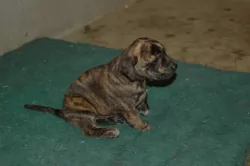 The Treeing Tennessee Brindle is a medium sized, deep chested breed of Cur, descending from the Old Brindle Cur dog.
The Treeing Tennessee Brindle is a medium sized, deep chested breed of Cur, descending from the Old Brindle Cur dog.
These strong dogs have a short, smooth brindle coat that is fairly soft to the touch. The coat's color is a mix of tan, black and a little bit of white.
He stands at between 41 and 61cm in height and weighs between 14 and 23kg both male and female. The Treeing Tennessee Brindle has a loud bark and it is best that this dog lives on a farm or in the suburbs as opposed to living in a small space in the city.
The Treeing Tennessee Brindle is a friendly, social dog and this is why he doesn’t make a particularly good watchdog.
He gets on well with children in the home as well as other dogs, not showing any aggression towards them.
They’re intelligent dogs and it will be a good idea to have them trained and socialized to make them well balanced and well behaved.
 The Basque Shepherd is a strong, well proportioned dog with brown eyes and medium sized ears, which sometimes have folds. This medium-to-large dog has a beautiful fawn coat of medium-length hair that can be straight or slightly wavy. He has a long feathery tail that will wag readily when he sees his owner. You’ll find other colors for the Basque Shepherd shared between the two varieties - a yellow orange or copper coat with other shades being red, blue and black. His hair is shorter on the head and he doesn’t battle with hair over the eyes.
The Basque Shepherd is a strong, well proportioned dog with brown eyes and medium sized ears, which sometimes have folds. This medium-to-large dog has a beautiful fawn coat of medium-length hair that can be straight or slightly wavy. He has a long feathery tail that will wag readily when he sees his owner. You’ll find other colors for the Basque Shepherd shared between the two varieties - a yellow orange or copper coat with other shades being red, blue and black. His hair is shorter on the head and he doesn’t battle with hair over the eyes.
The Basque Shepherd is a highly intelligent dog and also very energetic. Of the two different kinds of Basque Shepherd, it is the Gorbeiakoa which is the more outgoing. The dogs will require a firm owner and they thrive on the discipline when it is combined with lots of with lots of exercise and activities.
The Basque Shepherd is generally friendly with people, if not a little reserved with strangers. He gets on well with children and other pets in the home, although socialization and training will be necessary to bring out their best.
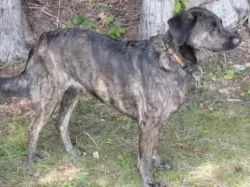 This brindle-colored cur dog is brave, intelligent and lively and his temperament allows him to be a good companion for his human family.
This brindle-colored cur dog is brave, intelligent and lively and his temperament allows him to be a good companion for his human family.
Even though they are friendly around strangers, they still make good watchdogs and will alert you to all kinds of visitors to your property. They do best in a home with large grounds and an active family where they can explore and sniff around. At the end of the day, they love to lie contentedly at your feet, a loyal, loving companion.
 The dog is well suited to being a family pet, loving to spend time with family, being a people-oriented breed. He gets on well with children as well as other pets in the home, but can be reserved with strangers.
The dog is well suited to being a family pet, loving to spend time with family, being a people-oriented breed. He gets on well with children as well as other pets in the home, but can be reserved with strangers.
He doesn’t have an aggressive nature, and yet he does what it takes to protect his beloved human family.
He is full of energy, hardy and tough. He loves his human family and wants to be included in all their activities. He is energetic though and as a responsible dog owner, you want to make sure that your Basque Shepherd has enough space to run.
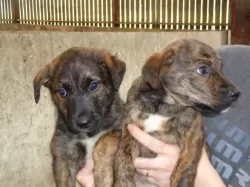 The Treeing Tennessee Brindle is a robust, healthy breed. You’re not likely to battle with too many health issues with him.
The Treeing Tennessee Brindle is a robust, healthy breed. You’re not likely to battle with too many health issues with him.
Watch out for ear infections which are more common in floppy eared dogs. Other common dog diseases that you need to know about -
This is a viral disease which is highly contagious and with no known cure. It’s why there is a vaccine against it. Coughing, lethargy, high temperature and loss of appetite with vomiting are symptoms of this disease.
This is another highly contagious respiratory viral infection transmitted between dogs in close proximity to each other, like in kennels for instance.
Symptoms include coughing, sneezing, nasal discharge, breathing difficulties, lethargy and loss of appetite. It’s important to get veterinary assistance as pneumonia could set in.
 Because this is an ancient breed, the Basque Shepherd doesn’t have to contend with genetic health problems such as more modern breeds. Just like other dogs though, he could be prone to certain conditions such as hip dysplasia, eye problems, ear infections and cancer. As a larger breed, he may also be prone to bloat.
Because this is an ancient breed, the Basque Shepherd doesn’t have to contend with genetic health problems such as more modern breeds. Just like other dogs though, he could be prone to certain conditions such as hip dysplasia, eye problems, ear infections and cancer. As a larger breed, he may also be prone to bloat.
Breeds with floppy ears, such as the Basque Shepherd will be more prone to developing ear infections. To prevent infection, keep his ears clean and dry. If you’re unsure, the vet can guide you how- and what to do.
This is a disease which is common to other dog breeds too and not just the Basque Shepherd. This condition affects the hip joints and can result in chronic pain for the dog and also lameness. Checking your dog’s weight is important and the pain can be managed with medication.
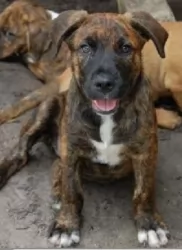 A brush once or twice a week will be sufficient for this dog. Look inside his ears for signs of redness which could indicate an ear infection. Make sure his eyes are still bright and not red and with a pus discharge. Trim his nails too.
A brush once or twice a week will be sufficient for this dog. Look inside his ears for signs of redness which could indicate an ear infection. Make sure his eyes are still bright and not red and with a pus discharge. Trim his nails too.
The Treeing Tennessee Brindle is a high energy dog and he is going o want more than just a walk every day, although he will love that and rely on you for this daily outing.
He will also want ball games and hide and seek games.The breed needs an active owner who will take him on long walks and hikes.
Whenever you opt to give a dog commercially manufactured dog food, you need to check that the dog food is made with high-quality ingredients which are mostly made up of protein or meat.
Certainly a puppy will need protein in his food for proper growth and he will require 4 bowls of food a day. An adult dog will require 2 bowls of food a day.
The type of commercial dog food you buy will depend on the age of your dog as well as his activity levels. If your dog has a known allergy or illness, there are dog foods manufactured with that in mind.
Try and in include some homemade food into his diet. Nothing spicey and exotic as this can cause stomach problems. A good guide is boiled chicken, brown rice and vegetables.
 This is a medium to large breed dog and he should therefore be fed a high quality food which has been formulated for medium to large breeds. Because he is a herding dog, you might want to also look at an active-dog or working-breed formula to supply him with that much needed energy.
This is a medium to large breed dog and he should therefore be fed a high quality food which has been formulated for medium to large breeds. Because he is a herding dog, you might want to also look at an active-dog or working-breed formula to supply him with that much needed energy.
The Basque Shepherd’s coat is lush and long with either straight or wavy hair. Regular brush at least twice a week will maintain the coat, get rid of loose hair and prevent fleas.
The Basque Shepherd is an intelligent breed that will respond well to socialization and training. He is a breed that loves sports too because of this very high energy levels. You need to be careful with the Basquae Shepherd around small children, not because he is aggressive in any way, but because he is highly active, and his exuberance and boisterous antics could see him unintentionally knocking over small children.